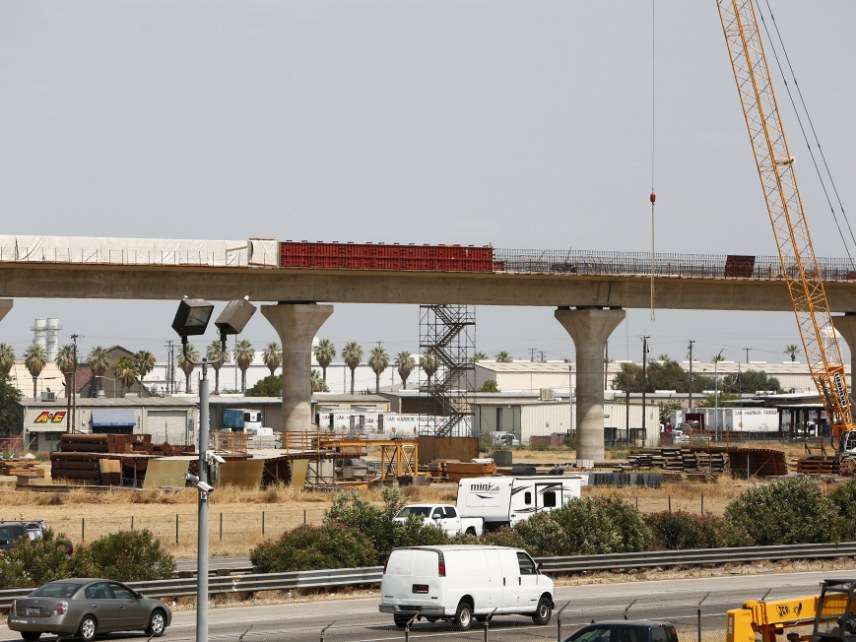More Money, More Problems—Bridge Problems—with California's Embattled Bullet Train
The state quietly ordered a bridge under construction to be rebuilt due to "signs of distress."

First California took billions of taxpayer dollars to build an unneeded, overpriced (but underbudgeted) bullet train through the middle of the state. Now, even though an operating train line doesn't even yet exist, part of it has to be rebuilt.
For the past several years, the state has been building its first segment of a high-speed rail line near Fresno. Late last year, the California High-Speed Rail Authority (CHSRA) ordered one of its contractors to stop construction of a bridge over a street and start it all over.
This apparently was all done fairly quietly. Los Angeles Times reporter Ralph Vartabedian (who has been doing excellent work documenting exactly how this gaping money pit has been growing larger and larger) just found out and wrote about the situation late last week:
In a statement, the authority said the Avenue 8 bridge design did not meet its "level of quality for a work product" and showed "signs of distress." Some time after last September, the authority had [contractor] Tutor Perini start on an entirely different design, agency documents show. The decision has not been previously reported.
The rail authority said it is discussing who will bear the cost of the rework.
I'm guessing…Californians? The head of Tutor Perini insists that the CHSRA previously approved the bridge structure, then changed its mind. Apparently the first bridge was made with retaining walls filled with carefully packed earth and concrete support pillars. The new version they want would use poured concrete instead of soil, which is less likely to fail.
It's also, obviously, going to be more expensive. Reason has been reporting the financial ups and downs of this train boondoggle for years. Californians may recall that the bullet train's boosters sold it to taxpayers by getting the purported price down to $68 billion. Critics have been warning all along that the agency had dramatically underestimated the cost of building the train; this incident is a good illustration of how that happened.
The train agency has now finally admitted that the project is going to cost billions more than estimated, possibly as much as $98 billion. Oh, and it's going to take longer to construct as well. Set your calendar for another decade, Californians! Seriously, it's not expected to be in service until 2029. By then we'll all have self-driving vehicles (I exaggerate—but maybe not as much as I think).
This giant boondoggle is a reminder that inflexible and expensive rail systems are not the right way to approach transit needs in a dynamic society like ours.
Unfortunately, one attempt to try to rein in the rail was just defeated at the polls. Gov. Jerry Brown and lawmakers have been using funds appropriated from an environmental cap-and-trade program to keep the construction going. (Voters authorized only $9 billion for the train in a ballot initiative passed in 2008.) An initiative on last week's primary ballot would have changed the rules to require two-thirds majority approval in the legislature to distribute money from the cap-and-trade program. The ballot initiative failed miserably, meaning lawmakers still need only a basic majority vote to allocate the money.


Show Comments (37)